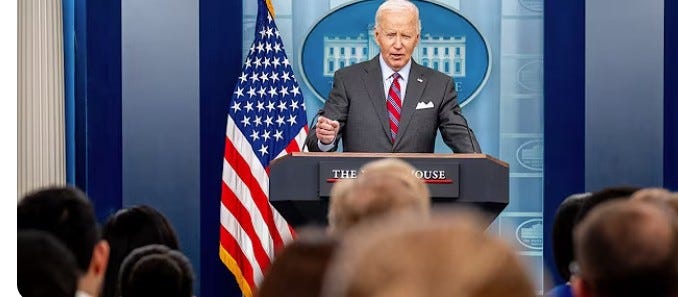Are the primaries going worse for Biden or Trump?
In Tuesday’s newsletter I explained why we wouldn’t be able to discern anything about Joe Biden’s general election prospects from that evening’s Michigan primary results.
To recap, no matter how many Michiganders voted “uncommitted” (the number ended up at about 101,000, 13 percent of the primary electorate), we can’t cleanly extrapolate how many of those are Biden ’20 voters who will not show up for him this November, in part because various leaders pushing an uncommitted vote made conflicting statements.
Meanwhile, Donald Trump keeps falling short of a unanimous verdict in the Republican primaries, as 27 percent of GOP voters in Michigan chose Nikki Haley.
Are we in any better position to draw conclusions about Trump’s standing with Republicans than we are about Biden’s standing with Democrats?
I’ll answer the best I can, but first, here’s the latest from the Washington Monthly:
***
***
To help answer this question, I look to the primary performances of our past one-term presidents.
Three incumbent presidents lost re-election in the modern primary era–Jimmy Carter, George H. W. Bush, and Trump.
Trump didn’t show any base weakness in the 2020 primaries, swatting away minor challengers and racking up 94 percent of the overall popular vote, which was also the exact share of his general election Republican vote according to exit poll data. (He was felled by independent swing voters and solid Democratic turnout.)
Carter is the only one of these incumbents to lose any primary contests, losing 12 states to Ted Kennedy. That previewed Carter’s weak grip on Democratic voters, 27 percent of whom would eventually vote for Reagan, and another 6 percent for independent John Anderson.
Bush ran the table, but Pat Buchanan gave him an early scare in New Hampshire, winning 37 percent of the vote.
Buchanan never replicated or surpassed that amount in subsequent primaries, but his national popular vote share of 23 percent did signal an undercurrent of right-wing discontent with Bush.
Come November, Bush would lose 17 percent of Republicans to independent Ross Perot and another 10 percent to Bill Clinton.
(Clinton, who kept losing chunks of 1992 primary voters to Jerry Brown and Paul Tsongas even after he was the presumptive nominee, had his own problems retaining Democrats in the general election. Thirteen percent voted for Perot and 10 percent voted for Bush.)
We don’t know yet what Trump’s national primary vote share will be. As of now it’s a middling 64 percent, with Haley at 32 percent.
Biden is at 83 percent, with uncommitted at 11, but that’s with Michigan disproportionately represented. I don’t expect future uncommitted vote shares to be as high. For comparison, Obama’s national popular vote share in the 2012 primaries was 91 percent, and Clinton’s in 1996 was 89 percent.
Haley’s best states–moderate New Hampshire and her home of South Carolina–would appear behind her, though Henry Olsen at Politico recently argued that on Super Tuesday next week she may do relatively well in Colorado, Maine, Massachusetts, Minnesota, North Carolina, Utah, Vermont, and Virginia.
In February polling of Super Tuesday states, Haley scored 38 percent in Massachusetts and 31 percent in Vermont, but mainly in the teens elsewhere.
I haven’t done a demographic analysis of each state’s Republican primary electorate to help project Trump’s and Haley’s final popular vote totals, but I suspect it will look like Bush’s 73 percent and Buchanan’s 23 percent in 1992.
Does that mean Trump will have a similar problem holding on to moderate Republicans as Bush did in 1992 with conservative Republicans?
Trump is a quasi-incumbent, not an actual incumbent, so perhaps the same dynamics won’t apply. Also, the 2024 primary exit polls haven’t asked Haley voters about their November plans; we can’t assume every Haley voter will be ultimately lost to Trump.
So our ability to assess Trump’s base weakness using the Haley vote as a metric is limited, similar to how we can’t easily extrapolate from the uncommitted vote on the Democratic side.
Nevertheless, despite our limitations, to my eye Trump looks to have a weaker hold on the Republican electorate than Biden has on the Democratic electorate.
FIND THE MONTHLY ON SOCIAL
We’re on Twitter @monthly
We’re on Threads @WAMonthly
We’re on Instagram @WAMonthly
We’re on Facebook @WashingtonMonthly
Best,
Bill











